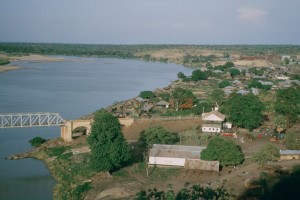
Jebba; Cosmopolitan community, located in Moro local government council of Kwara State is a town about 80-kilometres distance from Ilorin, the state capital and also a gateway town between Kwara and Niger states. Jebba is located on a hilly topography in an expanse of land bounded by River Niger. Two major problems confronted Jebba for a long time. They are bad roads and lack of water. Most of the intra-township roads were in bad condition without good drainage system. The major occupations of the inhabitants of the community from time immemorial include farming and trading.
Colonial era
Jebba community had played host to prominent people especially former colonial masters, including the first Governor-General of Nigeria, Lord Frederick Lugard and the first Chief Justice of the nation, Adetokunbo Ademola. Beyond formally serving as the first federal capital of Nigeria during the colonial period, the ancient town was indeed where the Royal Niger Charter was signed in the 1800s. Jebba houses the tomb of prominent white explorers in the country including that of Mungo Park and Lander brothers who were buried at a cemetery established by Lord Lugard when he was residing there. It is also the seat of the largest paper mill in West Africa, though later moribund. Other tourist attractions in the sleepy town are the Hydroelectric Power Dam which is a feeder to the Kanji Dam. Julius Beiger constructed bridge with a distance of about 10 kilometers and Power Holding Company of Nigeria, PHCN, among others.
Custom
One uniqueness of the royalty of the town is that unlike what obtains in other Yoruba kingdoms, with respect to wearing of beaded crown, Jebba monarch does not wear crown, but turban. The monarchs wear turban for religious purposes. Jebba is under Ilorin according to the emirate system. The emirate consists of five local government areas. When it was known as llorin Native Authority, all the present 16 council areas in the state were under llorin. Later on, when new councils were created then, they include Igbomina/Ekiti, Oyun and Ilorin. Politically today, every state of the federation was divided into three senatorial districts and at present, Jebba is in the Kwara North.
Origin
There two accounts, relating to founding of Jebba town. One of them stated that the community was founded by two brothers in the 18th century. They were Ademola Adebara and his younger brother, Odaso Adebara. They settled in Jebba having found a suitable habitation for themselves. They were said to have migrated from Ajasse-Ipo, Irepodun Local Government Area of the state. It was believed that they might have been to different places like Lokoja, before they decided to settle at \Afeba Island somewhere around Jebba, which was occupied mainly by the Nupes. But they were said to have left later on having found the place unsuitable for them, as there was no where to farm. Some areas in the community, however, fetch water from the very close to River Niger, and then moved from that area to the present location of Railway station because they were smaller in number. When one of them died, after burying the corpse, the hyena used to come in the night to exhume the corpse in that there was a big forest then. Later on, when railway construction started and the place was taken over by hyena, then there were thatch huts and no mud houses. The name ‘Jebba’ originated from the name ‘Unjebabaf The people don’t call the town Jebba, thus different names then. The Nupe called it ‘Eyagi’, ‘Jebba Emi’, (i.e. original Jebba).
Another accounts of the origin of Jebba stated that one Lanloke otherwise known as Okedare Lanloke, a warrior left old Oyo in early 1800 after the death of Alafin Abiodun. He was said to have left during the reign of Alafin Aole with his 147 lieutenants and families. Prominent among his followers were Mama Taku, Fainu, Odeku, Lawani Ode, Fami, Oyatope, Issa Gunmo and Ndache Dagba. It was said that when Okedare Lanloke got to the present day Jebba, the idols refused to cross River Niger. He then settled there and named the place “Oogodo” (meaning; Ibu don’t cross the river). His performance at the war earned him a nickname “Ajebabba”. The community later derived its name from his nickname: Jebba. Okedare Lanloke died in 1846 and was succeeded by his son, Dada as the Ajebba of Jebba. Dada was succeeded by Bakare. in 1916 during the reign of Bakare as Ajebba of Jebba, railway got to Jebba,while Prince Woro of Ilorin royal family was the district head of Lanwa. Adebola and Odaso Adebara who were natives of Igbomole near Ajase-Ipo followed railway to Jebba.
Westerner May 4, 2009





















